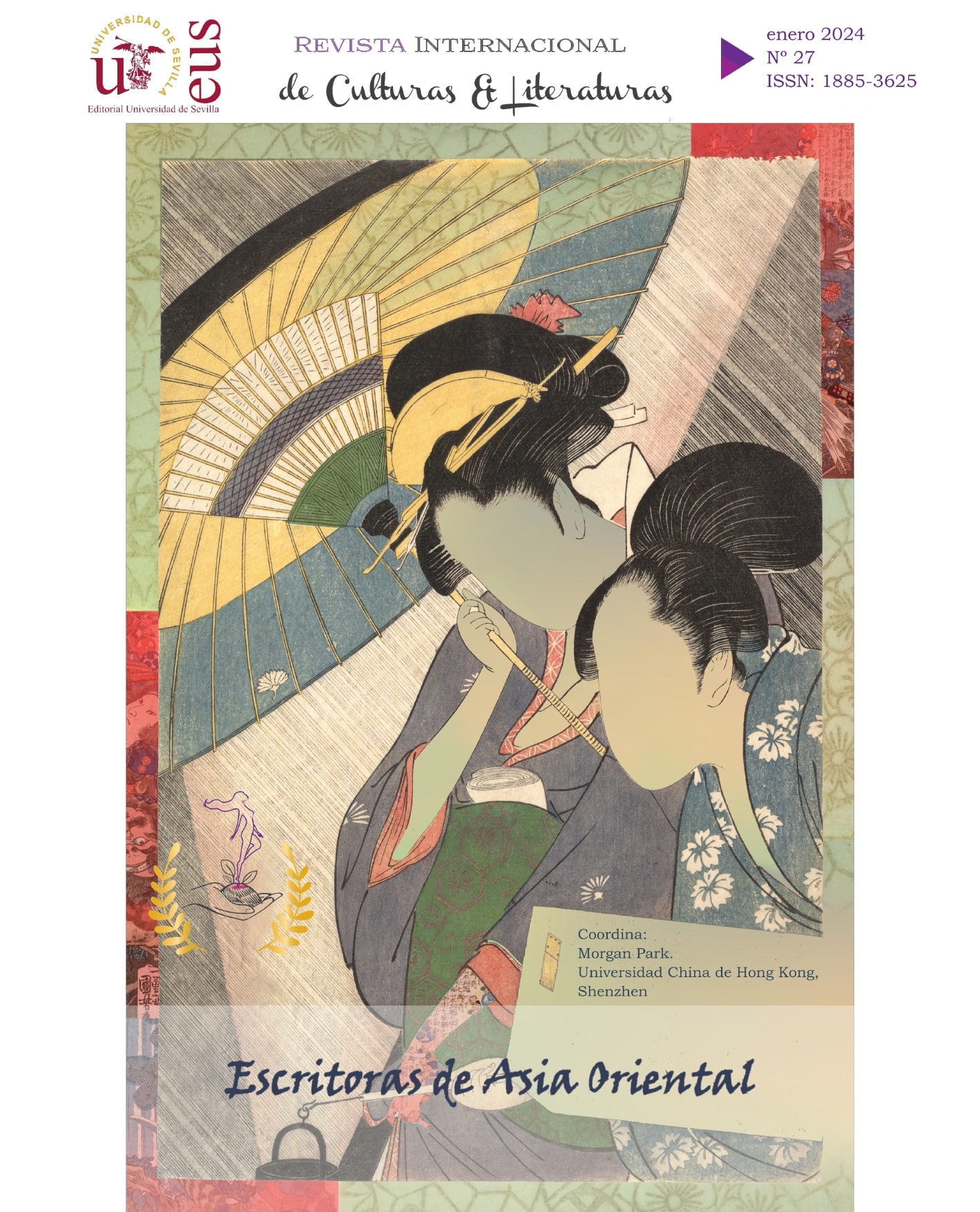WOMEN, FAMILY AND SOCIETY IN HAN KANG'S VEGETARIANA
DOI:
https://doi.org/10.12795/RICL2024.i27.09Keywords:
literature, South Korea, family, woman, feminismAbstract
South Korean society was traditionally based on a strongly patriarchal system, the effects of which are still evident today in family, work and social relations. Despite generational changes and the feminist struggle against the foundations of this system, the position of many women within the family hierarchy is still subordinate to that of men. This is the context depicted by the author Han Kang in her work The Vegetarian. A work that has received extensive international attention not only for describing the reality of many South Korean women but also because it deals with universal issues from a feminist point of view: the role of women in the family, the social status of women, oppression, or marital relations. This article will analyze, with a gender approach, what is the author's representation of South Korean women in the family and society. How they form mechanisms of rebellion that break against social standards and the patriarchal hegemonic structure. For a complete analysis, the article is complemented by an introduction to the situation of women in the social, family and work environment in South Korea.
Both the original version and the Spanish translated version of the play La Vegetariana will be used as sources. It is expected that the analysis of this work in its context will provide knowledge about the role of South Korean women in their family context. It will also contribute to the debate on the role of South Korean feminist literature in the struggle for gender equality in society.
Downloads
Metrics
References
ADAMS, Carol J. (1990). The sexual politics of meat. A feminist-vegetarian critical theory. Continuum.
BENÍTEZ PÉREZ, María Elena (2017). La familia: Desde lo tradicional a lo discutible. Revista Novedades en Población, 13(26), 58-68.
BICA, Paola (2023). The Vegetarian by Han Kang: A postmodern allegory for women’s fight for power and freedom. Rihumso: Revista de Investigación del Departamento de Humanidades y Ciencias Sociales, 23, 47-57.
BORDO, Susan (1994). Feminism, Foucault and the politics of the body. En Reconstructing Foucault (pp. 219-243). Brill.
BYUN, Hyo Jeong (2022). Desire of body-power and governmentality of life in The Vegetarian and Beloved. Studies on English Language & Literature, 48(2), 25-45. 변효정. [채식주의자 와 빌러비드 에 나타난 몸-권력 욕망과 생명의 통치성. 영어영문학연구, 48(2), 25-45.]
CHAKRABORTY, Ayush (2023). Experiencing the “other”: An ethical and ontological inquiry into the characterization of Yeong-hye in Han Kang’s The Vegetarian. International Journal of English and Comparative Literary Studies, 4(3), 1-12.
CHOI, Ji Won (2020). Analysis of the marital relationship in “Vegetarian” of the Han Gang: Focusing on object relation theory. The Journal of the Korea Contents Association, 20(12), 582-592.
CHOI, Yu Jin (2013). Male violence and female body in Kang Han’s “Vegetarian”. Feminist Studies in English Literature, 21(3), 205-235.
CHOO, Ryeo Na (2019). A study on Han Gang’s novel, Vegetarian [Tesis de máster]. Yanbian University. [조려나. 한강 연작 소설 《 채식주의자 》 연구. 아시아-아프리카언어문학. 연변대학]
DOMÉNECH, Antonio J. (2008). Religión, mitos y ritos en el mundo de las mujeres coreanas. Historia, historiografía y prácticas cotidianas [Tesis doctoral]. Universidad de Málaga.
HAN, Kang [2007] (2017b). La vegetariana. Ed: Channggi Publisher. 채식주의자. 경기도. 창비.
HAN, Kang (2017a). La vegetariana. Rata.
HUR, Song Woo (2011). Mapping South Korean women’s movements during and after democratization: Shifting identities. En East Asian social movements: Power, protest, and change in a dynamic region (pp. 181-203). Springer New York.
JEONG, MiSook (2008). Desire, the fragile absolute: An analysis on desires found in a part of Han Kang’s novel series, Vegetarian. Cogito, 64. 7-32. The Journal of PNU Humanities Institute. [정미숙. 「욕망, 무너지기 쉬운 절대성 – 한강 연작소설 『채식주의자』의 욕망분석」. 『코기토』]. (5), 7-32.]
KIM, Daniel Y. (2020). Translations and ghostings of history: The novels of Han Kang. New Literary History, 51(2/Spring), 375-399.
KIM, Jae-Kyeong (2009). Cultural symbolism between food and authority shown in fiction —with a focus on “Food habit” written by Kim I Tae and “The vegetarian” written by Han Kang. Feminist Korean Literature, 22, 251-281. [김재경. (2009). 소설에 나타난 음식과 권력의 문화기호학 -김이태 「식성」과 한강 「채식주의자」를 중심으로. 여성문학연구. 22, 251-281].
KIM, Sei Kyung (2023). The meaning of eating in the Han Kang’ novel from the perspective of psychological hunger. Journal of Contents and Industry, 5(3), 7-15.
KIM, Won Chung (2019). Eating and suffering in Han Kang’s The Vegetarian. Comparative Literature and Culture, 21(5).
KIM, Wook Dong (2018). The “creative” English translation of the Vegetarian by Han Kang. Translation Review, 100(1), 65-80.
KIM, Yeol-gyu (2012). El código de la comida. 15 códigos de la cultura coreana. Bajo la luna, 51-62.
KIM, Yong Nam (2018). Study on Images of Han Kang’s The Vegetarian-Focusing on the violent images. The Journal of Korean Technology, 13, 7-31.
KO, Yun Gyeong (2019). Escape and resistance: ‘Becoming’ of a woman in Han Kang’s The Vegetarian [Tesis de máster]. Seoul National University. [고윤경.「한강의 『채식주의자』에 나타난 여성의 '되기'」. 서울대학교 대학원.]
KYUNG, Ma Hye (2022). Reading the meaning and resistance of the female body in Han Kang’s the Vegetarian. The Journal of Korea Culture Technology, 32, 33-56. 마혜경 . [한강 『채식주의자』에 나타난 여성 몸의 의미와 저항 읽기. 한국문화기술. 32, 33-56].
LEE, Young Ja (2007). The capitalistic reconstruction of the patriarchal family. Hyonsang-gwa-Insik, 31(3), 72-94. [가부장제 가족의 자본주의적 재구성. 현상과인식, 31(3), 72-94].
LEE, Chan Kyu, y LEE, Eun Ji (2010). A research on ecofeminism shown in Han Gang’s Kang’s work The Vegetarian. The Journal of Humanities, 46, 43-67. [한강의 작품 속에 나타난 에코페미니즘 연구-『채식주의자』를 중심으로-. 인문과학, 46, 43-67.]
MCKINLEY, Nita M., y HYDE, Janet S. (1996). The objectified body consciousness scale: Development and validation. Psychology of Women Quarterly, 20(2), 181-215.
MOON, Seung-sook (2012). Begetting the nation: The androcentric discourse of national history and tradition in South Korea. En E. H. Kim y C. Choi, Dangerous women: Gender and Korean nationalism (pp. 33-66). Routledge.
NICHOLSON, Linda (Ed.) (1990). Feminism/postmodernism. Routledge.
O’KEEFE, Theresa (2014). My body is my manifesto! SlutWalk, FEMEN and femmenist protest. Feminist Review, 107(1), 1-19.
RYU, Y. (2009). Korea’s Vietnam: Popular culture, patriarchy, intertextuality. The Review of Korean Studies, 12(3), 101-123.
SAVITRI, Adella (2018). Subjectivity of women’s body as a resistance to the domination of patriarchy in novel Vegetarian by Han Kang. International Journal of English and Literature, 8(1), 1-10.
SHIN, Soo Jeong (2010). The meaning of being vegetarian in the novels of Han Kang: Focusing on the Vegetarian. Literature and Environment, 9(2), 193-211. [신수정.한강 소설에 나타나는 ‘채식’의 의미. 문학과환경, 9 (2), 193-211.]
WU, Zelin (2021). A study on the change of women’s consciousness in the Han Kang [Tesis de máster]. Kyung Hee University. [한강소설에서 나타난 여성의식변화 고찰. 경희대학교. 석사학위논문]
YAO, Xinzhong (2001). El confucianismo. Cambridge University Press.
WEBGRAFÍA
BBC (17 de mayo de 2016). Han Kang’s The Vegetarian wins Man Booker International Prize. https://www.bbc.com/news/entertainment-arts-36303604
LTI KOREA (n.d.). Han Kang. https://library.ltikorea.or.kr/writer/200306
NAVER DICTIONARY (s.f.). 호주제. 시사상식사전.
https://terms.naver.com/entry.naver?docId=74207&cid=43667&categoryId

Downloads
Published
How to Cite
Issue
Section
Accepted 2023-10-05
Published 2024-01-08
- Abstract 539
- PDF (Español (España)) 251



